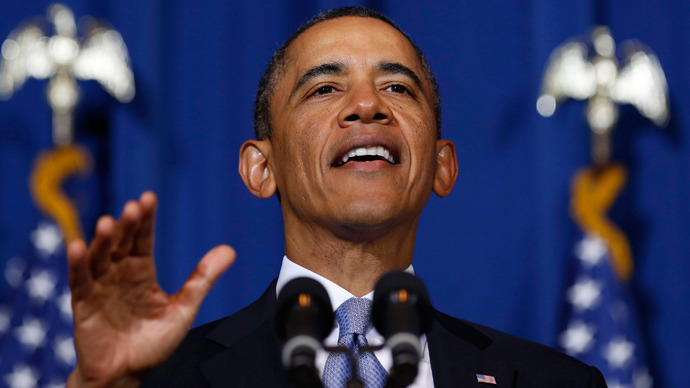The survivalist's guide to ‘Obamunism’ and beyond

The best way to jumpstart the US economy is “to chop federal spending in half, and then in half again next year,” argues professor Thomas J. DiLorenzo, author of the book ‘Organized Crime: The Unvarnished Truth About Government.’
“No statist lies are safe from his scrutiny,” Lew Rockwell wrote
about economist Thomas J. DiLorenzo’s latest book. What follows is
my conversation with professor DiLorenzo about ‘Organized Crime:
The Unvarnished Truth About Government,’ and the timeless economic
truths to which it speaks.
Ilana Mercer:A microscopic decrease in the increase in
government spending has sent our overlords in DC into apoplexy. A
cut in oink-sector spending, they’re claiming, will destroy the
chances of an economic recovery. It is the exact opposite. You
point this out in the chapter on ‘The Myth of Government Job
Creation’: “Government spending increases unemployment because it
crowds out so much private sector job creation” (page 202). Explain
with reference to the zero-sum nature of government spending the
cost of a government job, and Bastiat’s
‘What-is-seen-and-what-is-not-seen’ principle.
Thomas DiLorenzo: Every dollar that the government spends is
a dollar that is not spent, or saved, by individuals, families,
businesses and entrepreneurs. Therefore, whenever government
grows, private enterprise – the sole source of real job creation –
shrinks, and unemployment there rises. Each government job
destroys several genuine, private-sector jobs because of all the
bureaucracy and red tape. For example, government may spend
$200,000 to give one person a $30,000-a-year job. And
government ‘jobs’ are usually involved in doing something that no
one but a few politicians ever voiced a preference for.
Private sector jobs, by contrast, cannot survive unless they are
part of an enterprise that succeeds in satisfying genuine consumer
wants. By contrast, Keynesians like Paul Krugman would have
us believe that prosperity is created whenever government takes
money out of our bank accounts – with the threat of forcing us to
live in a cage for years if we do not pay – and letting government
bureaucrats squander the money instead.
Part of the Keynesian mantra is that such spending could and should
be on anything – it doesn’t matter, as long as it is government
that is doing the spending. The biggest year of
private-sector economic growth in American economic history was
1946, when the nation was in the middle of a two-thirds reduction
in federal government spending as the military was demobilized from
World War II. This proves that the Keyensians were always
dead wrong, but of course they and their political patrons ignore
this reality.

IM:You quip: "In Washingtonese, if one proposes a $100 billion spending increase, and actual spending increases by 'only' $90 billion, they call it a $10 billion budget cut." We're in the grip of exactly this kind of a paradox. How is the ‘Washington Monument Syndrome’ playing out in its ‘sequesteria’ version?
TD:The ‘Washington Monument Syndrome’ is an old bureaucratic trick that is so named because the head of the National Park Service closed down the Washington Monument – the most popular tourist attraction in Washington, DC – in the 1960s after Congress refused to fully fund his pie-in-the-sky spending wish list. Tourists from every state on their annual vacations called their congressmen to complain, forcing them to give the Park Service bureaucrat all the money he wanted.
State and local governments routinely use this sleazy gimmick by immediately threatening to shut down police protection, garbage collection, ambulance service, school buses and whatever else would impose maximum pain on the public whenever there is talk of fiscal responsibility. The Obama administration has taken this to buffoonish extremes by threatening to close down airports, et cetera, were government spending to increase by about one percentage point less than they wish over the next 10 years.
No one in Washington has proposed cutting a single cent out of the federal budget, despite the fact that the surest route to economic recovery would be to chop federal spending in half, and then in half again next year.
IM:Like tax havens, tax loopholes are ethical and efficient. Your point about efficiencies is especially good: “The time spent by citizens trying to legally avoid taxes is in fact a good investment of their time.” Decode the Orwellian Doublespeak of phrases like ‘simplifying the tax laws and revenue neutrality.’
TD:Politicians and statist economists intentionally confuse the public when they refer to proposed tax increases as ‘tax reform,’ and to tax cuts as ‘wasteful’ or ‘unnecessarily complicated.’ I have long agreed with Milton Friedman’s dictum that the cause of freedom and prosperity is always served by any tax cut, of any kind, at any time. One has to realize that the purpose of government is for those who run it to plunder those who do not.
Depriving political parasites of revenue is always and everywhere a good idea. The rhetoric of ‘revenue neutrality’ really means that under no circumstances should government – unlike everyone else in society – ever, ever spend a penny less next year than this year. Any tax reform should therefore never, ever end up putting more money in the pockets of the public at the expense of the political parasite class.
IM:Expect the “compassion of the IRS and the efficiency of the post office” from Obama’s healthcare plan, you forewarn. But as Obama’s army of harpies at CNN would argue, his politburo of proctologists has involved itself in the insurance industry merely to enhance markets. Or, to ‘bring down costs.’ Dispense with this idiotic notion.
TD:Government intervention always causes costs to rise and quality to decline. This has always been true; it has especially been true in the field of health care in places like Canada and Great Britain where healthcare was nationalized long ago. There is no reason to believe that the socialists in the Obama administration are better at socialism than were the Soviets, the Eastern Europeans, the Chinese, the Cuban government or anyone else.
The absence of a market feedback mechanism based on profits and losses guarantees government failure. Public choice economists refer to a ‘bureaucratic rule of two’ with regard to governmental provision of any type of service, based on hundreds of empirical articles that show that, on average, a government takeover of any function will double the per-unit cost of providing the product or service.
More on GDP, Obamacare and the elusive economic recovery at
Barely a Blog, where the conversation with professor DiLorenzo continues.
The statements, views and opinions expressed in this column are solely those of the author and do not necessarily represent those of RT.
The statements, views and opinions expressed in this column are solely those of the author and do not necessarily represent those of RT.













